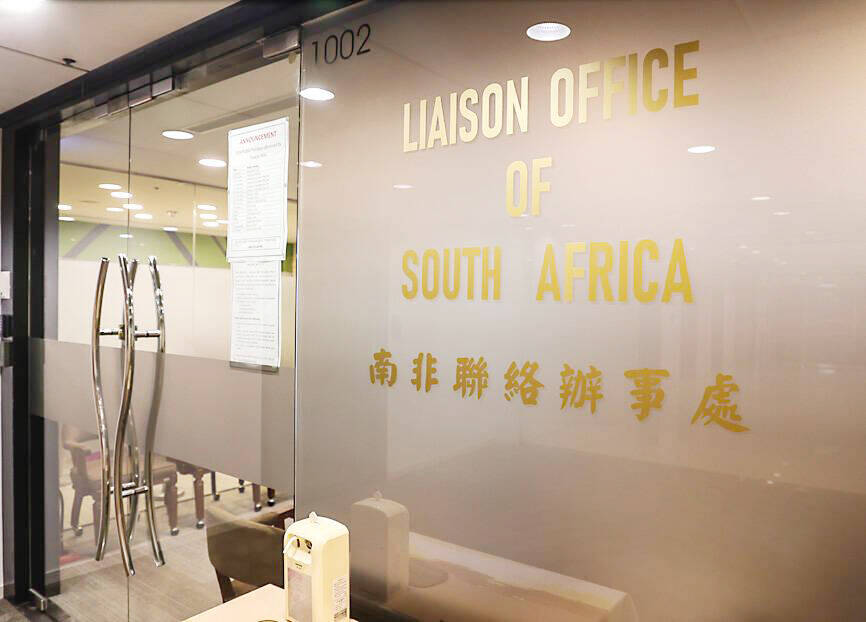The government is still awaiting a response from South Africa regarding its demand that Taiwan’s representative office be relocated from Pretoria and renamed by the end of last month.
Ministry of Foreign Affairs spokesman Hsiao Kuang-wei (蕭光偉) yesterday said that Taipei has proposed talks with Pretoria regarding its delegation in the country and is potentially open to signing a new agreement, but the South African side has not responded.
As of yesterday morning, the Taipei Liaison Office in the Republic of South Africa was operating normally in Pretoria, he said.

Photo: CNA
Last year, the South African government demanded that the office be categorized as a “trade office” and moved from Pretoria to the commercial capital, Johannesburg.
It initially set the deadline as October last year, before extending it to the end of last month.
South Africa unilaterally changed the name of the Taipei office on its Department of International Relations and Cooperation Web site from the “Taipei Liaison Office” to the “Taipei Commercial Office” early last month.
The Ministry of Foreign Affairs protested the move, calling for talks between the two sides.
Taiwan has said that China was behind the South African government’s push to relocate and rename the office, as Pretoria has cited UN General Assembly Resolution 2758 and Beijing’s “one China principle” as the reasons for the change.
The resolution was adopted in 1971 to address the issue of China’s representation in the global body, resulting in the Republic of China losing its UN seat to the People’s Republic of China.
After South Africa severed diplomatic ties with Taiwan in 1998, Taiwan established a representative office in Pretoria under the name Taipei Liaison Office based on a 1997 agreement.

‘DENIAL DEFENSE’: The US would increase its military presence with uncrewed ships, and submarines, while boosting defense in the Indo-Pacific, a Pete Hegseth memo said The US is reorienting its military strategy to focus primarily on deterring a potential Chinese invasion of Taiwan, a memo signed by US Secretary of Defense Pete Hegseth showed. The memo also called on Taiwan to increase its defense spending. The document, known as the “Interim National Defense Strategic Guidance,” was distributed this month and detailed the national defense plans of US President Donald Trump’s administration, an article in the Washington Post said on Saturday. It outlines how the US can prepare for a potential war with China and defend itself from threats in the “near abroad,” including Greenland and the Panama

The High Prosecutors’ Office yesterday withdrew an appeal against the acquittal of a former bank manager 22 years after his death, marking Taiwan’s first instance of prosecutors rendering posthumous justice to a wrongfully convicted defendant. Chu Ching-en (諸慶恩) — formerly a manager at the Taipei branch of BNP Paribas — was in 1999 accused by Weng Mao-chung (翁茂鍾), then-president of Chia Her Industrial Co, of forging a request for a fixed deposit of US$10 million by I-Hwa Industrial Co, a subsidiary of Chia Her, which was used as collateral. Chu was ruled not guilty in the first trial, but was found guilty

A wild live dugong was found in Taiwan for the first time in 88 years, after it was accidentally caught by a fisher’s net on Tuesday in Yilan County’s Fenniaolin (粉鳥林). This is the first sighting of the species in Taiwan since 1937, having already been considered “extinct” in the country and considered as “vulnerable” by the International Union for Conservation of Nature. A fisher surnamed Chen (陳) went to Fenniaolin to collect the fish in his netting, but instead caught a 3m long, 500kg dugong. The fisher released the animal back into the wild, not realizing it was an endangered species at

DEADLOCK: As the commission is unable to forum a quorum to review license renewal applications, the channel operators are not at fault and can air past their license date The National Communications Commission (NCC) yesterday said that the Public Television Service (PTS) and 36 other television and radio broadcasters could continue airing, despite the commission’s inability to meet a quorum to review their license renewal applications. The licenses of PTS and the other channels are set to expire between this month and June. The National Communications Commission Organization Act (國家通訊傳播委員會組織法) stipulates that the commission must meet the mandated quorum of four to hold a valid meeting. The seven-member commission currently has only three commissioners. “We have informed the channel operators of the progress we have made in reviewing their license renewal applications, and